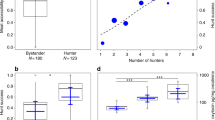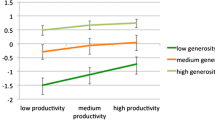Abstract
Our society is sustained by wide-ranging cooperation. If individuals are sensitive to others’ gains and losses as well as the amount of labor, they can ensure future beneficial cooperative interaction. However, it is still an open question whether nonhuman primates are sensitive to others’ labor. We asked this question in tufted capuchin monkeys in an experimental food-sharing situation by comparing conditions with labor by two participants equalized (Equal labor condition) or unequalized (Unequal labor condition). The operator monkey pulled the drawer of one of the two food containers placed between two monkeys, each containing a food for him/herself and another for the recipient monkey. The recipient received either high- or low-value food depending on the operator’s choice, whereas the operator obtained the same food regardless of his/her choice. In Unequal labor condition, the operator first had to pull the handle of the board to which the containers were glued and then pull the drawer of one of the containers, while the recipient received food with no labor. In Equal labor condition, the recipient had to pull the handle of the board so that the operator could operate a container. Results showed that operators chose the high-value food container for recipients more often than when the recipient was absent only in Equal labor condition. This suggests that capuchin monkeys are sensitive to others’ labor and actively give food to a partner who has helped them to complete a task.





Similar content being viewed by others
References
Aghion E, Caroli E, Garcia-Penalosaand C (1999) Inequality and economic growth: The perspective of the New Growth Theories. J Econ Lit 27:1615–1660
Anderson JR (2007) Animal behavior: tolerant primates cooperate best. Curr Biol 17(7):R242–R244
Anderson JR, Kuroshima H, Kuwahata H, Fujita K (2004) Do squirrel monkeys (Saimiri sciureus) and capuchin monkeys (Cebus apella) predict that looking leads to touching? Anim Cogn 7(3):185–192
Anderson JR, Kuroshima H, Hattori Y, Fujita K (2005a) Attention to combined attention in New World monkeys (Cebus apella, Saimiri sciureus). J Comp Psychol 119(4):461–464
Anderson JR, Kuwahata H, Kuroshima H, Leighty K, Fujita K (2005b) Are monkeys aesthetists? Rensch (1957) revisited. J Exp Psychol Anim Behav Process 31(1):71–78
Anderson JR, Hattori Y, Fujita K (2008) Quality before quantity: rapid learning of reverse-reward contingency by capuchin monkeys (Cebus apella). J Comp Psychol 122(4):445–448
Anderson JR, Kuroshima H, Paukner A, Fujita K (2009) Capuchin monkeys (Cebus apella) respond to video images of themselves. Anim Cogn 12(1):55–62
Anderson JR, Kuroshima H, Fujita K (2010) Delay of gratification in capuchin monkeys (Cebus apella) and squirrel monkeys (Saimiri sciureus). J Comp Psychol 124(2):205–210
Baldovino MC, Di Bitetti MS (2008) Allonursing in tufted capuchin monkeys (Cebus nigritus): milk or pacifier? Folia Primatol 79:79–92
Boyd RT, Richerson P (2005) The origin and evolution of cultures. Oxford, New York
Bräuer J, Call J, Tomasello M (2006) Are apes really inequity averse? Proc R Soc Lond B Biol Sci 273:3123–3128
Bräuer J, Call J, Tomasello M (2009) Are apes inequity averse? New data on the token-exchange paradigm. Am J Primatol 71:175–181
Brosnan SF (2006) Nonhuman species’ reaction to inequity and their implications for fairness. Soc Justice Res 19:153–185
Brosnan SF, de Waal FBM (2003) Monkeys reject unequal pay. Nature 425:297–299
Brosnan SF, de Waal FBM (2006) Partial support for a non-replication: commentary on Roma, Silberberg, Ruggiero, and Suomi (2006). J Comp Psychol 120(1):74–75
Brosnan SF, Schiff HC, de Waal FBM (2005) Tolerance for inequity may increase with social closeness in chimpanzees. Proc R Soc Lond B Biol Sci 272:253–258
Brosnan SF, Freeman C, de Waal FBM (2006) Partner’s behavior, not reward distribution, determines success in an unequal cooperative task in capuchin monkeys. Am J Primatol 68:713–724
Brosnan SF, Houser D, Leimgruber K, Xiao E, Chen T, de Waal FBM (2010a) Competing demands of prosociality and equity in monkeys. Evol Hum Behav 31:279–288
Brosnan SF, Talbot C, Ahlgren M, Lambeth SP, Schapiro SJ (2010b) Mechanisms underlying responses to inequitable outcomes in chimpanzees, Pan troglodytes. Anim Behav 79(6):1229–1237
Burkart JM, Fehr E, Efferson C, van Schaik CP (2007) Other-regarding preferences in a non-human primate: Common marmosets provision food altruistically. Proc Natl Acad Sci USA 104:19762–19766
Clutton-Brock T (2002) Breeding together: kin selection and mutualism in cooperative vertebrates. Science 296:69–72
Crawford MP (1937) The cooperative solving of problems by young chimpanzees. Comp Psychol Monogr 14:1–88
Cronin KA, Snowdon CT (2008) The effects of unequal reward distributions on cooperative problem solving by cottontop tamarins, Saguinus Oedipus. Anim Behav 75(1):245–257
Cronin KA, Kurian AV, Snowdon CT (2005) Cooperative problem solving in a cooperatively breeding primate (Saguinus oedipus). Anim Behav 69(1):133–142
Cronin KA, Schroeder KKE, Rothwell ES, Silk J (2009) Cooperatively breeding cottontop tamarins (Saguinus oedipus) do not donate rewards to their long-term mates. J Comp Psychol 123(3):231–241
de Waal FBM (1996) Good natured: The origins of Right and Wrong in Humans and Other Animals. Harvard Univ Press, Cambridge MA
de Waal FBM, Berger ML (2000) Payment for labour in monkeys. Nature 404:563
de Waal FBM, Suchak M (2010) Prosocial primates: selfish and unselfish motivations. Phil Trans R Soc B 365:2711–2722
de Waal FBM, Leimgruber K, Greenberg AR (2008) Giving is self-rewarding for monkeys. Proc Natl Acad Sci USA 105:13685–13689
Dindo M, de Waal FBM (2007) Partner effects on food consumption in brown capuchin monkeys. Am J Primatol 69:1–9
Dubreuil D, Gentile MS, Visalberghi E (2006) Are capuchin monkeys (Cebus apella) inequity averse? Proc R Soc Lond B Biol Sci 273:1223–1228
Dugatkin LA (1997) Cooperation among animals. An evolutionary perspective. Oxford University Press, Oxford
Fletcher GE (2008) Attending to the outcome of others: disadvantageous inequity aversion in male capuchin monkeys (Cebus apella). Am J Primatol 70:901–905
Fontenot MB, Watson SL, Roberts KA, Miller RW (2007) Effects of food preferences on token exchange and behavioural responses to inequality in tufted capuchin monkeys, Cebus apella. Anim Behav 74(3):487–496
Fragaszy DM, Visalberghi E, Fedigan LM (2004) The complete capuchin: the biology of the genus Cebus. Cambridge Univ Press, New York
Fujita K (2004) How do nonhuman animals perceptually integrate figural fragments? Jpn Psychol Res 46:154–169
Fujita K, Giersch A (2005) What perceptual rules do capuchin monkeys (Cebus apella) follow in completing partly occluded figures? J Exp Psychol Anim Behav Process 31(4):387–398
Fujita K, Kuroshima H, Masuda T (2002) Do tufted capuchin monkeys (Cebus apella) spontaneously deceive opponents? A preliminary analysis of an experimental food-competition contest between monkeys. Anim Cogn 5(1):19–25
Fujita K, Kuroshima H, Asai S (2003) How do tufted capuchin monkeys (Cebus apella) understand causality involved in tool use? J Exp Psychol Anim Behav Process 29(3):233–242
Fujita K, Sato Y, Kuroshima H (in press) Learning and generalization of tool use by tufted capuchin monkeys (Cebus apella) in tasks involving three factors: reward, tool, and hindrance. J Exp Psychol Anim Behav Process
Hare, Kwetuenda (2010) Bonobos voluntarily share their own food with others. Curr Biol 20(5):R230–R231
Hattori Y, Kuroshima H, Fujita K (2005) Cooperative problem solving by tufted capuchin monkeys (Cebus apella): spontaneous division of labor, communication, and reciprocal altruism. J Comp Psychol 119(3):335–342
Hattori Y, Kuroshima H, Fujita K (2007) I know you are not looking at me: capuchin monkeys’ (Cebus apella) sensitivity to human attentional states. Anim Cogn 10(2):141–148
Hattori Y, Kuroshima H, Fujita K (2010) Tufted capuchin monkeys (Cebus apella) show understanding of human attentional states when requesting food held by a human. Anim Cogn 13(1):87–92
Henrich J (2004) Inequity aversion in capuchins? Nature 428:139
Hirata S, Fuwa K (2007) Chimpanzees (Pan troglodytes) learn to act with other individuals in a cooperative task. Primates 48:13–21
Jensen K, Hare B, Call J, Tomasello M (2006) What’s in it for me? Self-regard precludes altruism and spite in chimpanzees. Proc R Soc Lond B Biol Sci 273:1013–1021
Kuroshima H, Fujita K, Fuyuki A, Masuda T (2002) Understanding of the relationship between seeing and knowing by tufted capuchin monkeys (Cebus apella). Anim Cogn 5(1):41–48
Kuroshima H, Fujita K, Adachi I, Iwata K, Fuyuki A (2003) A Capuchin monkey (Cebus apella) recognizes when people do and do not know the location of food. Anim Cogn 6(4):283–291
Kuroshima H, Kuwahata H, Fujita K (2008) Learning from others’ mistakes in capuchin monkeys (Cebus apella). Anim Cogn 11(4):599–609
Lakshminarayanan VR, Santos LR (2008) Capuchin monkeys are sensitive to others’ welfare. Curr Biol 18(21):R999–R1000
Lakshminarayanan VR, Santos LR (2009) Cognitive preconditions for responses to fairness: An object retrieval task in capuchin monkeys (Cebus apella). J Neurosci Psychol Econ 2(1):12–20
Melis AP, Hare B, Tomasello M (2006a) Engineering cooperation in chimpanzees: tolerance constraints on cooperation. Anim Behav 72(2):275–286
Melis AP, Hare B, Tomasello M (2006b) Chimpanzees recruit the best collaborators. Science 311:1297–1300
Melis AP, Warneken F, Jensen K, Schneider AC, Call J, Tomasello M (in press) Chimpanzees help conspecifics obtain food and non-food items. Proc R Soc Lond B Biol Sci
Morimoto Y, Fujita K (in press) Capuchin monkeys (Cebus apella) modify their own behaviors according to a conspecific’s emotional expressions. Primates
Neiworth JJ, Johnson ET, Whillock K, Greenberg J, Brown V (2009) Is a sense of inequity an ancestral primate trait? Testing social inequity in cotton top tamarins (Saguinus oedipus). J Comp Psychol 123(1):10–17
Paukner A, Anderson JR, Fujita K (2004) Reactions of capuchin monkeys (Cebus apella) to multiple mirrors. Behav Process 66:1–6
Pelé M, Thierry B, Call J, Dufour V (2010) Monkeys fail to reciprocate in an exchange task. Anim Cogn 13(5):745–751
Roma PG, Silberberg A, Ruggiero AM, Suomi SJ (2006) Capuchin monkeys, inequity aversion, and the frustration effect. J Comp Psychol 120(1):67–73
Silberberg A, Crescimbene L, Addessi E, Anderson JR, Visalberghi E (2009) Does inequity aversion depend on a frustration effect? A test with capuchin monkeys (Cebus apella). Anim Cogn 12(3):505–509
Silk JB, Brosnan SF, Vonk J, Henrich J, Povinelli DJ, Richardson AS, Lambeth SP, Mascaro J, Schapiro SJ (2005) Chimpanzees are indifferent to the welfare of unrelated group members. Nature 437:1357–1359
Stevens JR (2004) The selfish nature of generosity: Harassment and food sharing in primates. Proc R Soc B 21:451–456
Stevens JR (2010) Donor payoffs and other-regarding preferences in cotton-top tamarins (Saguinus oedipus). Anim Cogn 13(4):663–670
Takimoto A, Kuroshima H, Fujita K (2010) Capuchin monkeys (Cebus apella) are sensitive to others’ reward: an experimental analysis of food-choice for conspecifics. Anim Cogn 13(2):249–261
van Wolkenten M, Brosnan SF, de Waal FBM (2007) Inequity responses of monkeys modified by effort. Proc Natl Acad Sci USA 104:18854–18859
Vonk J, Brosnan SF, Silk JB, Henrich J, Richardson AS, Lambeth SP, Schapiro SJ, Povinelli DJ (2008) Chimpanzees do not take advantage of very low cost opportunities to deliver food to unrelated group members. Anim Behav 75(5):1757–1770
Wynne CDL (2004) Fair refusal by capuchin monkeys. Nature 428:140
Yamamoto S, Tanaka M (2009) Do chimpanzees (Pan troglodytes) spontaneously take turns in a reciprocal cooperation task? J Comp Psychol 123(3):242–249
Yamamoto S, Tanaka M (2010) The influence of kin relationship and reciprocal context on chimpanzees’ other-regarding preferences. Anim Behav 79(3):595–602
Acknowledgments
This study was supported by the Research Fellowships of the Japan Society for the Promotion of Science (JSPS) for Young Scientists (No. 21264 to Ayaka Takimoto), the Grant-in-Aid for Scientific Research (No. 20220004 to Kazuo Fujita) from JSPS, and the Japan Ministry of Education, Culture, Sport, Science, and Technology (MEXT) Global COE Program, D-07, to Kyoto University. The subject monkeys were originally provided by the Cooperation Research Program from the Primate Research Institute, Kyoto University, with Tetsuro Matsuzawa as the counterpart. We also gratefully acknowledge Hika Kuroshima and James R. Anderson, for various suggestions on our manuscript.
Author information
Authors and Affiliations
Corresponding author
Electronic supplementary material
Below is the link to the electronic supplementary material.
Rights and permissions
About this article
Cite this article
Takimoto, A., Fujita, K. I acknowledge your help: capuchin monkeys’ sensitivity to others’ labor. Anim Cogn 14, 715–725 (2011). https://doi.org/10.1007/s10071-011-0406-5
Received:
Revised:
Accepted:
Published:
Issue Date:
DOI: https://doi.org/10.1007/s10071-011-0406-5




